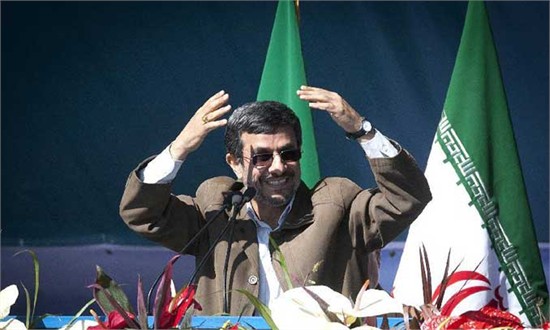
Iranian President Mohmoud Ahmadinejad speaks at the 33th anniversary of Islamic Revolution victory at the Azadi Square in Tehran, the capital of Iran on February 11, 2012. Photo: Xinhua
Iranian President Mahmoud Ahmadinejad will travel to Beijing by mid-March, officials in Tehran said Monday, with analysts saying the trip will aim to secure oil exports to China amid a fresh wave of Western sanctions.
Ramin Mehmanparast, a spokesman for Iran's foreign ministry, told the Global Times that Ahmadinejad would visit China soon along with a high-level delegation.
Key topics will include economic cooperation and political issues, including wider-ranging Middle East matters, Mehmanparast said.
His words echoed earlier remarks by Iranian Foreign Minister Ali Akbar Salehi, who said Ahmadinejad would visit China before the end of the Iranian calendar year on March 19 at the invitation of the Chinese leadership.
Ahmadinejad's trip to China would come after visits to Beijing by Western leaders, including German Chancellor Angela Merkel, who sought to persuade China to join in sanctions against Iran.
The EU reached an agreement last month to ban Iranian oil imports starting from July and freeze the assets of Iran's central bank on its territory. US President Barack Obama last week ordered a freeze on property and assets belonging to the Iranian government, its central bank and all Iranian financial institutions.
By declining to join in the sanctions, China insisted that talks are the only way to resolve nuclear disputes with Iran.
Mohammad Kermani, a professor with Iran's Institute for Political and International Studies, told the Global Times that through Ahmadinejad's trip, Iran seeks to deepen strategic and political cooperation with China.
"Iran hopes China can play a more important role in the global political arena. China has a full-fledged economy, and it could only be deemed as a global power if it plays a bigger role in international politics," Kermani said.
Meanwhile, Chinese Assistant Foreign Minister Ma Zhaoxu flew to Tehran on Sunday for a two-day visit to discuss the Iranian nuclear issue.
Ma said that China is willing to maintain close communication with related parties to promote the early resumption of talks between six representative nations - Britain, China, France, Russia, the US and Germany - and Iran.
According to China's foreign ministry, Ma also urged Iran to enhance cooperation with the International Atomic Energy Agency (IAEA), with the Iranian side replying that it is willing to resume talks with the six nations at an early date and continue to strengthen cooperation with the IAEA.
Li Weijian, director at the Center of Western Asian and African Studies of the Shanghai Institutes for International Studies, told the Global Times that China's mediation is crucial in solving the Iranian nuclear issue as Western countries and Iran are reluctant to engage with each other.
"Ahmadinejad is eager to visit Beijing and to have direct talks with Chinese leaders. After the EU announced the oil embargo, a move threatening to cut Iran's economic pillar, it is crucial for Ahmadinejad to ensure China and other major Asian oil importers do not follow suit," Li said.
Iranian Oil Minister Rostam Qasemi is reportedly making a trip to China from Sunday to Thursday. He will also visit Japan, India and Russia.
In response to Western sanctions, Iran threatened to close the Strait of Hormuz.
On Sunday, the US Navy said Tehran had been building up its naval forces in the Gulf and had prepared boats that could be used in suicide attacks.
Vice Admiral Mark Fox told reporters that the US Navy is confident in preventing Iran from blocking the Strait of Hormuz, but stressed that diplomacy should be given priority in resolving tensions.
Ahmadinejad announced Saturday on the 33rd anniversary of the Islamic Revolution that the Islamic Republic would soon announce advances in its nuclear program.
"We should wait, but you can be sure the new achievements are for peaceful purposes and for the benefit of Iran," Mehmanparast said, adding that Iran could maintain the security and stability of the Gulf and the Strait of Hormuz without interference from outside forces.
Li said it is Ahmadinejad's strategy to consolidate the domestic opinion that Iran can continue developing nuclear technology.
"Given fresh sanctions from the West and parliamentary elections in March, Ahmadinejad's announcement would boost domestic confidence and garner public support," Li said.
Also Monday, bombers targeted Israel's embassies in India and Georgia, wounding four people. Israeli Prime Minister Benjamin Netanyahu accused Iran and Lebanese militant group Hezbollah of being involved.
However, Iran's ambassador to New Delhi, Mehdi Nabizadeh, slammed the accusations.
"Any terrorist attack is condemned (by Iran) and we strongly reject the untrue comments by an Israeli official," Nabizadeh was quoted by the IRNA News Agency as saying. "These accusations are untrue and sheer lies, like previous times."

Copyright ©1999-2011 Chinanews.com. All rights reserved.
Reproduction in whole or in part without permission is prohibited.